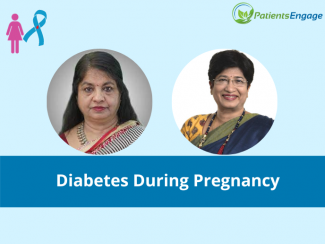
Diabetes is a growing concern in India, affecting younger people especially women during pregnancy. This article based on the webinar discussion with Dr. Usha Sriram (Endocrinologist, Founder of Diwas NGO) & Dr. Gita Arjun (Obgyn, Director, E V Kalyani Medical Foundation) helps us understand diabetes and its management during pregnancy.
What is Gestational Diabetes?
Any type of Diabetes first diagnosed during pregnancy is known as Gestational Diabetes. It can be of two types. Gestational diabetes which occurs due to hormonal changes during pregnancy and it may be identified in the later stage of pregnancy or typically diagnosed in the second trimester. Whereas diabetes that is diagnosed in the first trimester indicates that the woman may have had undiagnosed diabetes before pregnancy. However, all diabetes in pregnancy is to be treated and taken seriously.
What is the diagnosis process for Gestational Diabetes?
To identify pregnant women with Gestational diabetes, selective screening was preferred a few years ago. The selection was based on age, family history of diabetes, previous abortions, weight, and PCOS being high-risk factor. However, it was discovered that many cases were missed in this method. It was identified that in countries like India, Nepal, Sri Lanka, Pakistan, and Southeast Asia the risk is high. Hence, now it is recommended that all pregnant women should be screened for Gestational diabetes during pregnancy. Screening should be done at the first antenatal visit with a Glucose tolerance test. Due to high prevalence of Gestational diabetes in various states, i.e., in Punjab 35%, in Lucknow 41%, the Government of India has emphasized universal screening of all pregnant women.
Do women proactively seek preconception counselling?
Preconception counselling plays a very important role and it is essential to improve women's health during pregnancy. But unfortunately, most pregnancies are unplanned in India. 50% of total worldwide pregnancies are unplanned and most unplanned pregnancies happen in low and middle income countries. Various factors like anemia, diabetes, nutritional deficiencies, coping mechanism, vaccination delays, alcohol, and smoking has to be considered during prenatal care. Doctors must educate people before starting their pregnancy by measuring their ideal weight, BMI and by ensuring they are not hypertensive or diabetic. Whereas some women with family history of diabetes are being proactive during prenatal care, women who are on oral pills or insulin often seek advice from doctors before getting pregnant. That is very crucial as high sugar can put mother and baby at risk during pregnancy.
What is the recommended approach for women diagnosed with Gestational Diabetes?
Obstetrician and Physician must work together for better health of the mother during pregnancy, because the mother's weight, pre-eclampsia, blood sugar level, vision, amniotic fluid level, protein in urine, baby's growth, etc. has to be closely monitored. Medical nutrition help is the primary form of treatment for a diabetic woman as 60 to 70% of patients can be managed by it, where women are informed about how much and which micro and macronutrients to be included in their diet as balanced diet. Physical activity with 45 minutes of walking is emphasized at every checkup. Hence medical nutrition which is dietary changes and physical activity is a critical element of managing diabetes during pregnancy.
What are the options other than Insulin for treatment of diabetes during pregnancy?
Insulin is the first choice for pregnant women as it has been used for years and is known to be safe in pregnancy. But, metformin is also used if a mother cannot or won't take insulin. It is approved by professional societies like the UK Nice guideline and the National guidelines. Other than this drugs like ligeride was also used, but due to its potential to cause hypoglycemia in mother and NICU admission of babies due to low sugar it has fallen out of choice. In India, insulin is more difficult to access and difficult to teach in hospitals. Insulin pens are very expensive. Government of India guidelines say that metformin is safe and if a mother can't take insulin herself or can't afford it then metformin would be a better option.
What is the follow up protocol for women diagnosed with Gestational diabetes?
The follow-up protocol for pregnant women with diabetes includes more careful monitoring with early ultrasounds at 11-14 weeks, 20 weeks, and often around 24 weeks, and again at 28 weeks if needed. The focus is on monitoring the baby's growth and abdominal circumference to avoid macrosomic (excessively large) babies because uncontrolled sugar and hyperinsulinemia from the mother affect the size of the baby. If the mother is on insulin, the delivery may be planned by 38 weeks to avoid complications with larger babies because that can lead to difficulties at the time of delivery. There is an increased risk of obesity, diabetes, metabolic syndrome, low blood sugar, neonatal jaundice for baby, and even sudden stillbirth can happen if the mother's blood sugar is not under control. Hence, close surveillance of both the mother's blood sugar levels and the baby's well-being is important throughout pregnancy.
What are the risks and consequences of the baby being large due to Gestational Diabetes?
There are less chances of normal delivery in case of large babies due to fat deposition around the shoulders. It is difficult for baby to come out through birth canal resulting in C-section or forceps delivery.
Does the type of Diabetes affect the baby?
Yes, careful monitoring of the mother's health is required in both types of diabetes. If the mother is diagnosed with diabetes in the first trimester, she is at higher risk as she might have type two diabetes even before she is pregnant. Whereas in case of gestational diabetes diagnosed at the seventh month, it has to be followed up regularly. Early diagnosis is very important to avoid complications like stillbirth, large babies, or polyhydramnios.
What is the management protocol for type 1 or post kidney transplant Diabetic women?
Preconception counseling is essential as it can lead to better pregnancy outcomes. The risk of birth defects is identified in both types of diabetic women if their sugar is not under control. A simple protocol has to be followed that they have to be on folic acid and should take insulin without fail. In case of post-kidney transplant blood pressure, cholesterol, and heart health has to be monitored before conceiving to determine if a woman can carry baby safely. Keeping a check on end-organ complications and adjusting medications for Blood pressure or cholesterol is also important. Type 1 diabetic women have risk of small babies or growth-restricted babies due to compromised blood flow to the placenta. Overall balanced diet, constant monitoring, and insulin are helpful for the successful delivery of a healthy baby.
Management protocol for women who have Gestational Diabetes after kidney transplant.
For a woman with gestational diabetes after a kidney transplant, constant monitoring is important as managing immunosuppressants and adjusting drug doses are required to lower the risk. Whereas for type 1 diabetic women with existing end-organ complications, surrogacy or adoption is a safe choice as pregnancy can worsen their condition.
What will be the effect of Diabetes on type of delivery?
Most women with gestational diabetes can have normal delivery. Hence, it is not an indication for a c-section. However, diabetic women should be delivered by 40-week full term without fail. C-section can be done for other reasons like breach, placenta previa or the baby is too large for the mother.
Gestational diabetes will resolve by its own after delivery. True or myth?
It is a myth. Majority of women return to their normal glucose level after delivery but, 20% -25% have abnormal glucose levels. Dietary changes and physical exercise to maintain a healthy weight and waist is important to avoid future health issues. The baseline diabetes rate in India is high. Hence, regular blood glucose monitoring is required whether your diabetes is resolved or not.
I can lose weight all together after second pregnancy: a misconception or fact?
It is a misconception and it is not a healthy approach. Gaining extra weight in between pregnancies is harmful for mother and baby. Balanced diet and weight management under the guidance of ObGyn play a crucial role in avoiding future complications.
What chronic conditions are women with Gestational Diabetes predisposed to?
Women with Gestational diabetes may be predisposed to several risks such as heart disease, stroke, fracture, cancer, depression, and other diabetic complications.
Studies have shown that there is an increased risk of heart disease and cancer in diabetic people. prevention Proper care before pregnancy and during postpartum period is essential for a healthy pregnancy.
Definitive norms of blood sugar for GDM (gestational diabetes mellitus).
It depends on the various guidelines. WHO and the American Diabetes Association use the IADPF guideline, where a 75-gram glucose test is done with a fasting level of 92. After one-hour level of upto 180 and two-hour level of upto 153 are considered normal. Any abnormal value is sufficient to consider as Gestational diabetes. Whereas in DIPSY and The Indian National Guidelines, a blood sugar level of upto 140 at two hours is considered as gestational value. The choice depends on accessibility and availability of facilities.
How to counsel a woman who has developed Diabetes during pregnancy?
It is important to be positive, address the anxiety of the mother and family, and aware them about the seriousness of situation. For better health of mother and baby, dietary counseling of family members or caregivers or who cooks meals for mother is essential to support dietary changes. They should be informed about the importance of diet during pregnancy and maintaining blood glucose levels. Counseling should also cover cultural norms and stigma about gestational diabetes and should be simplified in the local language for better acceptance by family members. It must include various risks a mother and baby can face during pregnancy. Regular counseling can help them understand and process the information. By creating a non-threatening environment and spreading awareness we can put her on a healthy trajectory of life.
Final message by Dr. Gita Arjun:
The most important thing for women is to be very, very well informed, to be very positive, and to be proactive about their pregnancy. Diabetes and pregnancy is a wake-up call! It is not something to be ignored it has to be followed up on. Constant checking at every six months or every year is necessary. It is a combined partnership between the doctor and the patient.
Final message by Dr. Usha Sriram:
All women should understand that pre-conception care is essential and they must share this knowledge and encourage other women, their daughters & daughter in laws to take better care during their reproductive years mainly before six months of pregnancy. Women being primary caregivers in the family, they can improve their health and nutrition, along with that of their family, during this time and turn this into a positive experience.
Conclusion by moderator:
Be informed and manage it proactively. It is a window to your future health as a woman but also of your children and grandchildren. Do not take this condition lightly but manage it properly.







